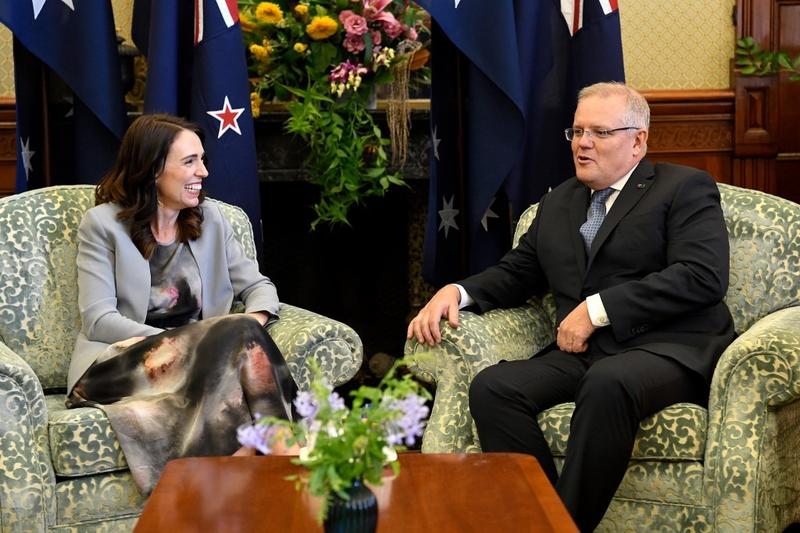 In this Feb 28, 2020 file photo, New Zealand's Prime Minister Jacinda Ardern (left) chats with Australia's Prime Minister Scott Morrison (right) during their meeting at Admiralty House in Sydney. (BIANCA DE MARCHI / POOL / AFP)
In this Feb 28, 2020 file photo, New Zealand's Prime Minister Jacinda Ardern (left) chats with Australia's Prime Minister Scott Morrison (right) during their meeting at Admiralty House in Sydney. (BIANCA DE MARCHI / POOL / AFP)
SYDNEY/WELLINGTON — Australia and New Zealand said on Tuesday efforts to resume travel between them would take some time, as they make cautious moves to re-open economies largely shuttered by the novel coronavirus.
The two countries have closed their borders to all non-citizens for more than a month and imposed mandatory quarantines on anyone returning home from overseas
The two countries have closed their borders to all non-citizens for more than a month and imposed mandatory quarantines on anyone returning home from overseas.
New Zealand Prime Minister Jacinda Ardern on Tuesday became the first world leader to join an Australian Cabinet meeting in more than 60 years. She said reopening the route between them would take a while to work through.
“When we feel comfortable and confident that we both won’t receive cases from Australia, but equally that we won’t export them, then that will be the time to move,” Ardern told reporters in Wellington after attending the meeting via video with Australian ministers as well as state and territory leaders.
“Neither of us want cases of COVID coming between our countries.”
Australia reported a new death from COVID-19 on Tuesday, in an aged care facility in Sydney’s west; that took its total to 97, with around 6,800 recorded infections.
New Zealand, which had had no new COVID-19 cases for a second day in a row, has recorded 20 fatalities and 1,137 infections. Ardern has vowed to completely eliminate the pathogen from the country of about five million people.
Australian Prime Minister Scott Morrison said travel across the Tasman Sea between the neighbours would be the first international route re-started and would likely begin around the time domestic air travel restarts in earnest.
“When we are seeing Australians travel from Melbourne to Cairns, at about that time I would expect everything being equal we would be able to fly from Melbourne to Auckland or Christchurch,” Morrison told reporters in Canberra.
Morrison has said a decision about easing federal restrictions will be taken on Friday, as he said igniting Australia’s economy was vital with unemployment set to top 10 percent.
ALSO READ: Australia, NZ discuss possible trans-Tasman 'travel bubble'
Rules on social distancing have been eased slightly in New Zealand and in some Australian states and territories but restrictions on large gatherings and non-essential travel remain and some Australian states are still closed to outsiders.
Qantas Airways Ltd Chief Executive Alan Joyce said regular flights between Australia and New Zealand could begin soon after domestic routes were reopened.
“It could be a very good model for the international market opening up in phases,” the chief of Australia’s largest airline told reporters.
Qantas is currently operating only 5 percent of its pre-crisis domestic passenger network and 1 percent of its international network.
ECONOMIC CLIFF
Reopening the travel route would be a major boon for both countries as strict social distancing restrictions severely crimp both economies.
Australia may have lost almost a million jobs between mid-March and mid-April as large chunks of the economy shut down in the fight against the coronavirus, according to new figures from the Australian Bureau of Statistics.
Canberra has unveiled economic support measures worth about A$320 billion (US$206 billion) or about 16 percent of GDP, as restrictions on public movement push the country toward its first recession in nearly 30 years.
The Reserve Bank of Australia forecast the world’s 12th-biggest economy would suffer its largest ever contraction in the first half of the year, sending the unemployment rate into double-digits, but held out the hope of a recovery as the coronavirus was contained.
Treasurer Josh Frydenberg said the economic impact of the pandemic would have been a lot worse if Australia had followed Europe’s example and imposed stricter controls on all non-essential services.
READ MORE: Australia, NZ mark Anzac Day at home amid pandemic
While, Australia has closed pubs and forced restaurants to offer takeaway services only, other shops remained open.
“If these restrictions were increased even further, akin to the eight-week lockdown in Europe, then the adverse economic impact on GDP could double to 24 percent, or A$120 billion, in the June quarter,” the treasurer said in a speech in Canberra.
“This was the cliff we were standing on.”


